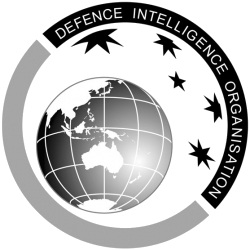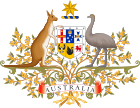
The Joint Intelligence Committee (JIC) is an interagency deliberative body responsible for intelligence assessment, coordination, and oversight of the Secret Intelligence Service, Security Service, GCHQ, and Defence Intelligence. The JIC is supported by the Joint Intelligence Organisation under the Cabinet Office.

The Office of National Assessments (ONA) was an Australian statutory intelligence agency established by the Office of National Assessments Act 1977 as an independent statutory body directly accountable to the Prime Minister of Australia as a portfolio agency of the Department of the Prime Minister and Cabinet. ONA provided all-source assessments on international political, strategic and economic developments to the Prime Minister and the National Security Committee of Cabinet. ONA also played a coordination role in the Australian Intelligence Community through evaluating foreign intelligence products, convening the National Intelligence Coordination Committee, and developing relationships with intelligence agencies around world.

Defence Intelligence (DI) is an organisation within the United Kingdom intelligence community which focuses on gathering and analysing military intelligence. It differs from the UK's intelligence agencies in that it is an integral part of the Ministry of Defence (MoD) rather than a stand-alone organisation. The organisation employs a mixture of civilian and military staff and is funded within the UK's defence budget. The organisation was formerly known as the Defence Intelligence Staff (DIS), but changed its name in 2009.
A war cabinet is a committee formed by a government in a time of war. It is usually a subset of the full executive cabinet of ministers. It is also quite common for a war cabinet to have senior military officers and opposition politicians as members.

The Privy Council Office is the central agency of the Government of Canada which acts as the secretariat to the Cabinet of Canada – a committee of the Privy Council for Canada – and provides non-partisan advice and support to the Canadian ministry, as well as leadership, coordination, and support to the departments and agencies of government.

The Defence Intelligence Organisation (DIO) is an Australian government military intelligence agency responsible for strategic intelligence and technical intelligence assessments, advising defence and government decision-making on national security and international security issues, and the planning and conduct of Australian Defence Force operations. The DIO does not collect intelligence or conduct covert action, but works on defence economics, transnational terrorism, and WMD.
The Australian Intelligence Community (AIC) and the National Intelligence Community (NIC) or National Security Community of the Australian Government are the collectives of statutory intelligence agencies, policy departments, and other government agencies concerned with protecting and advancing the national security and national interests of the Commonwealth of Australia. The intelligence and security agencies of the Australian Government have evolved since the Second World War and the Cold War and saw transformation and expansion during the Global War on Terrorism with military deployments in Afghanistan, Iraq and against ISIS in Syria. Key international and national security issues for the Australian Intelligence Community include terrorism and violent extremism, cybersecurity, transnational crime, the rise of China, and Pacific regional security.
The National Security Council (NSC) of India is an executive government agency tasked with advising the Prime Minister's Office on matters of national security and strategic interest. It was established by the former prime minister of India Atal Bihari Vajpayee on 19 November 1998, with Brajesh Mishra as the first National Security Advisor. Prior to the formation of the NSC, these activities were overseen by the Principal Secretary to the preceding Prime Minister.
The Department of Defence is a department of the Government of Australia charged with the responsibility to defend Australia and its national interests. Along with the Australian Defence Force (ADF), it forms part of the Australian Defence Organisation (ADO) and is accountable to the Commonwealth Parliament, on behalf of the Australian people, for the efficiency and effectiveness with which it carries out the Government's defence policy.
The Department of the Prime Minister and Cabinet (PM&C) is an Australian Government public service central department of state with broad ranging responsibilities, primary of which is for intergovernmental and whole of government policy coordination and assisting the Prime Minister of Australia in managing the Cabinet of Australia. The PM&C was established in 1971 and traces its origins back to the Prime Minister's Department established in 1911.
New Zealand's intelligence agencies and units have existed, with some interruption, since World War II. At present, New Zealand's intelligence community has approximately 550 employees, and has a combined budget of around NZ$145 million.
The National Assessments Bureau (NAB), previously known as the External Assessments Bureau (EAB), is a New Zealand intelligence analysis agency within the Department of the Prime Minister and Cabinet (DPMC). The NAB along with the Government Communications Security Bureau and the New Zealand Security Intelligence Service is one of the three core members of New Zealand's intelligence community. It provides assessments to the Prime Minister, other Ministers, senior officials and New Zealand's diplomatic missions abroad, on events and developments that bear on New Zealand's interests, especially in regard to matters of national security.
The Joint Intelligence Organisation (JIO) was an Australian government intelligence agency that existed between 1969 and 1990 and which was responsible for the analysis of defence and foreign intelligence.

Nicholas Peter Warner is an Australian diplomat, intelligence official, public servant, and the Director-General of the Office of National Intelligence since 20 December 2018.
The Appointments Committee of the Cabinet (ACC) decides appointments to several top posts under the Government of India. The committee is composed of the Prime Minister of India, the Minister of Home Affairs. Originally the Minister-in-charge of the concerned Ministry was also the part of the committee but as per the new notification the minister of concerned ministry has been excluded from the committee.
The National Committee for Intelligence Coordination is the principal forum used by the Prime Minister of Bangladesh for matters of national security and co-ordination between intelligence agencies. Since its inception under Sheikh Hasina, the function of the council has been to advise and assist the prime minister on national security and foreign policies. The committee also serves as the prime minister's principal arm for co-ordination, integration of intelligence on foreign, defence, and internal security matters by bringing together the principal civilian and military intelligence outfits. The council has counterparts in the Joint Intelligence Committee of many other nations.

The National Security Committee (NSC), also known as National Security Committee of Cabinet, is the peak decision-making body for national security and major foreign policy matters in the Australian Government. It is a committee of the Cabinet of Australia though decisions of the NSC do not require the endorsement of the Cabinet itself.
The Department of Home Affairs is the Australian Government interior ministry with responsibilities for national security, law enforcement, emergency management, border control, immigration, refugees, citizenship, transport security and multicultural affairs. The portfolio also includes federal agencies such as the Australian Federal Police, Australian Border Force and the Australian Security Intelligence Organisation. The Home Affairs portfolio reports to the Minister for Home Affairs The Hon. Peter Dutton MP and is led by Secretary of the Department of Home Affairs Mike Pezzullo.
The Office of National Intelligence (ONI) is an Australian statutory intelligence agency responsible for advising the Prime Minister and National Security Committee, the production of all-source intelligence assessments, and the strategic development and enterprise management of the National Intelligence Community. The ONI is directly accountable to the Prime Minister of Australia as a portfolio agency of the Department of the Prime Minister and Cabinet.







